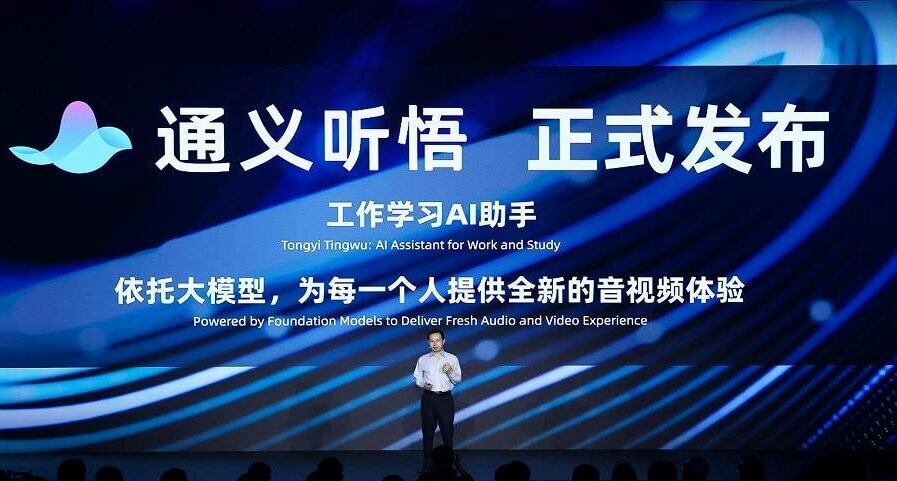
(Source – Alibaba)
Alibaba Tingwu in public beta after LLM integration
- Alibaba Cloud’s large language model Tongyi Qianwen will be integrated into a digital assistant called Tingwu
- Tingwu will be integrated into DingTalk and can be used in several channels
While Open AI’s ChatGPT and Google’s Bard dominate the news on generative AI chatbots, Chinese tech companies have also been developing their versions. In March 2023, Chinese search engine giant Baidu unveiled its Ernie Bot version. However, the excitement of Ernie Bot was short-lived as the technology could not cope at the same level as ChatGPT or Bard.
A month later, Alibaba Cloud unveiled its version of a ChatGPT-style product called Tongyi Qianwen. Compared to Ernie Bot, Tongyi Qianwen was more like ChatGPT and was quick to gain praise for its capabilities on Chinese social media.
Now, Alibaba Cloud has announced that Tongyi Qianwen will be integrated into a digital assistant called Tingwu. Tingwu is an AI-powered meeting assistant developed by the Speech Lab of Alibaba DAMO Academy. The technology converts spoken meeting content into written minutes in real-time.
In a media statement, Alibaba Cloud stated that Tongyi Qianwen would enable Tingwu to comprehend and analyze multimedia content with high levels of accuracy and efficiency, such as generating summary text from video and audio files, capturing key talking points for each speaker, and creating a timeline of multimedia files with a summary of each section.
Additional AI features are expected to be available later this year. These features include automatically compiling text answers to address user queries across audio or video files, generating a summary based on PowerPoint slides extracted from videos, and providing real-time translation between English and Chinese for multimedia content with Tingwu as a Chrome plugin.
Available for public beta testing, the large language model (LLM) powered Tingwu called Tongyi Tingwu will also be integrated into DingTalk. DingTalk is Alibaba’s digital collaboration workspace application development platform, supporting users’ AI demands at work. The general public can access the upgraded AI-powered assistant online (tingwu.aliyun.com) to experience its capabilities through their Alibaba Cloud accounts.
“We live at a time when a growing amount of video and audio content is consumed in various formats daily. In line with this, Tongyi Tingwu aims to use the large language model to facilitate faster and better comprehension and easier multimedia content sharing,” said Jingren Zhou, CTO of Alibaba Cloud Intelligence.
Large language models are the core technology of generative AI. Conversational chatbots using LLM like Tingwu, ChatGPT, and Bard can generate better results based on the information they provide. As such, there has been some criticism of some of the results provided by these chatbots. This includes providing outdated information as well as generating results that are outside the prompt.
The US and China continue to compete with each other on technology supremacy. Chinese tech giants are investing heavily in improving their AI capabilities, especially after the government imposed stricter regulations and limits on the use of technology in some industries.
Apart from Alibaba and Baidu, Tencent also wants its own ChatGPT-style products. However, the company is in no hurry to develop the technology which could be embedded into its super app – WeChat. Huawei has also registered several patents that show the company’s interest in developing a human-to-AI conversation system.
READ MORE
- Data Strategies That Dictate Legacy Overhaul Methods for Established Banks
- Securing Data: A Guide to Navigating Australian Privacy Regulations
- Ethical Threads: Transforming Fashion with Trust and Transparency
- Top 5 Drivers Shaping IT Budgets This Financial Year
- Beyond Connectivity: How Wireless Site Surveys Enhance Tomorrow’s Business Network


